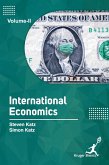Economic Indicators: Introduce key economic indicators used to assess the health of an economy, including Gross Domestic Product (GDP), unemployment rates, inflation rates, and balance of trade, and their implications for economic policy. Aggregate Demand and Supply: Discuss the concepts of aggregate demand and aggregate supply, and how they interact to determine overall economic output and price levels in the economy. Economic Growth: Examine factors that contribute to long-term economic growth, including capital accumulation, technological advancements, labor force growth, and productivity improvements. Monetary Policy: Explore the role of monetary policy in managing economic stability, including the tools used by central banks (e.g., interest rates, open market operations) to influence money supply, inflation, and economic activity. Fiscal Policy: Discuss fiscal policy measures undertaken by governments to influence economic performance, including taxation, government spending, and budget deficits or surpluses. Inflation and Deflation: Analyze the causes and effects of inflation and deflation on the economy, including their impact on purchasing power, interest rates, and economic stability. Unemployment: Explore different types of unemployment (e.g., frictional, structural, cyclical) and their implications for the labor market and overall economic health.
Bitte wählen Sie Ihr Anliegen aus.
Rechnungen
Retourenschein anfordern
Bestellstatus
Storno








